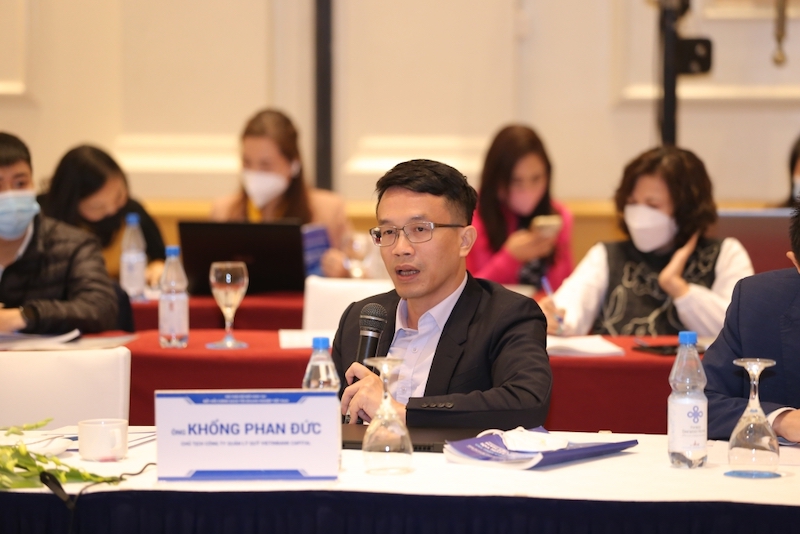Policies proposed to support Vietnamese SMEs in innovation
Many initiatives are given by local management agencies to promote and connect businesses with otherorganizations in innovation projects.
A program to support digital transformation in enterprises, cooperatives and business households for the 2021 - 2025 period will be submitted by the Vietnamese Ministry of Planning and Investment to the Prime Minister for approval.
This is one of many policies to promote innovation activities of the Vietnamese business community over recent years, local insiders said.
| An overview of the event. Photos: MPI |
At the hybrid workshop “Innovation: Connecting policies with Vietnamese businesses” on December 15, Vu Quoc Huy, Director of the National Center for Innovation and Creativity (NIC) under the Ministry of Planning and Investment (MPI) said in Vietnam, mechanisms and policies to support businesses in terms of connection and innovation are always the priority.
The establishment of the NIC is to materialize the desire to assist local businesses to together deploy innovation activitiesin Vietnam as well as connect Vietnamese intellectual groups and entrepreneurs at home and abroad to develop the Vietnam Innovation Network.
As a representative from the National Technology Innovation Fund under the Ministry of Science and Technology, Dr. Chu Duc Hoang said science - technology and innovation are considered a key pillar for the country’s socio-economic development.
In order to support the business community, the Fund with a charter capital of VND2 trillion (US$86.7 million), hasdeployed policies to support enterprises operating in technological innovation and startup through expanding financial support and implementation of loan guarantee for enterprises who can borrow capital from commercial banks.
Small and medium-sized enterprises (SMEs) working towards innovation or joining industry clusters, and in the value chain are entitled to benefit from the SMEs Development Fund (SMEDF), according to Hoang Thi Hong, the SMEDF’s Director under the MIC.
“The Fund is considered as one of the urgent solutions to support start-ups to access capital, in the context of the thirst for funding,” she underlined.
Bui Thu Thuy, Deputy Director of the MIC’s Enterprise Development Agency, said the innovation process is always in parallel with digital transformation activities. The agency has provided knowledge, roadmap and technology solution instructions for businesses to self-deploy digital transformation.
“We also organized training courses to raise awareness for businesses on digital transformation,” she said.
From a business view, Nguyen Thy Nga, General Director of V-startup Investment and Management Group said the MPI has taken many initiatives and created networks to connect businesses with other organizations, investors and investment funds across the country to implement innovation projects.
| Delegates attend the event |
Delegates at the event said many existing problems arising from the innovation process among the business community still has to be addressed.
A recent survey by the Ministry of Science and Technology showed that the responded enterprises said their innovation activities are investment in new technologies associated with machinery and equipment (39.4%) or upgrading current technology and equipment (39.3%).
Notably, the majority of the respondents only spent 1.6% of total annual revenue on research and development activities, lower than many countries in the region including Laos (14.5%), the Philippines (3.6%), and Malaysia (2.6%).
About 80% of the surveyed enterprises said that they have not cooperated with other units/organizations to carry out any innovation activities.
Hoang from the National Technology Innovation Fund said many enterprises are facing difficulties in enhancing capacity, organizing research and development activities, setting up development funds, accessing financial support sources and maintaining the ecosystem between universities, scientists and sustainable entrepreneurs.
“In addition, the lack of information about the State's policies and forms of support on innovation is a barrier that prevents businesses from taking advantage of opportunities or benefits in promoting innovation,” he added.
Thy Nga suggested that Vietnam should continue to focus on reforming open mechanisms and policies, administrative procedures and behaviors towards businesses at all levels, contributing to creating motivation, passion and excitement for them.
To survive and grow, businesses need to focus on the market demand, actively transform and apply scientific achievements, as well as increase economic benefits by relying on technological progress and upgrading technology, sheproposed.













